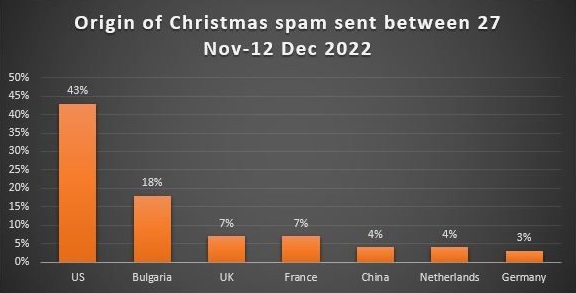Cybersecurity: how to avoid Christmas-themed scams?

Christmas-themed spam has increased since November 27th, with Ireland being the most targeted country, while the majority of fraudulent emails were sent from USA, as highlighted by Bitdefender Antispam Lab.
Christmas-themed spam: the data by Bitdefender Antispam Lab
For cybercriminals, Christmas means more opportunities to catch people off guard and steal money and data. Bitdefender points out that:
- the volume of Christmas-themed spam rate has increased consistently since November 27th, with spikes in unsolicited correspondence observed between December 6th and December 9th;
- 1% of all Christmas spam emails (by volume) hit inboxes in the US and 24% reached users in Ireland, according to Bitdefender antispam telemetry. Sweden, France and Denmark also received 7% each of all Christmas spam (by volume), followed by the UK with 6%, Germany with 4%, Italy and Australia with 1% each;
- 43% of all Christmas-themed spam emails (by volume) were sent from IP addresses in the US and 18% from Bulgaria.

Tens of thousands of spam holiday-themed emails have been sneaking into users’ inboxes in the past weeks, and Bitdefender Antispam researchers advise consumers to remain vigilant. 2022 Christmas spam trends take advantage of the usual subjects, including:
- holiday giveaways;
- fake surveys;
- discount shopping for designer goods;
- Christmas online dating opportunities and access to premium adult content.
The letter-from-Santa scam
The letter-from-Santa scam promises parents a special package containing both an ‘official’ nice-list certificate for their kids, alongside customized and signed letters from Santa himself. Letters and Christmas-themed packages are often quite cheap and come with free shipping.
Unwary parents who fall victim can lose funds and become the target of identity thieves who abuse their information to commit fraud.
Online dating spam
Users were also bombarded with online dating spam. “We’ve often underlined – they say from the Bitdefender Antispam Lab – the risks of unsolicited dating and adult-themed emails that end up in the inboxes of users every day. The websites are set up for one reason only: to trick individuals into opening their wallets. Many of the profiles found on these platforms are not linked to real-life people, but the operators do a good enough job of seducing ‘potential’ victims with promises to meet up”. Users who interact with such correspondence and sign up on the website will lose time and money.
The Bitdefender Antispam Lab specifies that in Germany users were enticed by premium access to adult video platforms.
How to avoid Christmas scams?
Scam emails in the run-up to Christmas can be very enticing. Recipients should stop and think before engaging with unsolicited correspondence that is too good to be true. “Sensational offers – they continue from the Bitdefeder Antispam Lab – free money, vouchers or gift cards that come your way just in time for some last-minute holiday shopping are always a scam and can jeapordize your data, money and privacy”.
Careless interactions with spam messages bring serious consequences that can ruin the celebrations. To avoid these scams, people should:
- never fill out online surveys for gift cards and other goods that ask for credit card information or other sensitive data;
- not access links in unsolicited emails or messages on social networks offering great bargains or exclusive access to deals;
- make Christmas purchases on familiar websites;
- never install software from unknown sources advertised in spam emails;
- use a reliable security solution that can protect against malware and block phishing and fraudulent websites.
Pictures by Bitdefender.














